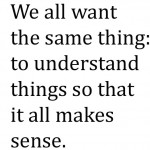 Prov. 1.1-2: “The proverbs of Solomon…for attaining wisdom and discipline; for understanding words of insight…”
Prov. 1.1-2: “The proverbs of Solomon…for attaining wisdom and discipline; for understanding words of insight…”
The book of Proverbs starts out in a way that could have started out the whole Bible, or, frankly, any other book with important stuff in it: We’re writing this because we want to understand things. Technically it says: The proverbs [are] for becoming wise, learning to do what ought to be done, and being able to have intelligent conversations about what’s true and not true.
Now I would think all of us would like that, whether you’re a believer (a follower of Jesus) or not. You still want to figure things out and be right about what you’re thinking. Nobody goes around believing things they know to be wrong. We think that what we believe is right, or we wouldn’t believe it. That’s all we’re after—what we’re all after. We want to know what’s right and what’s wrong in how we run our businesses, how we live our relationships, how we use our money and our stuff, and the decisions we make. We don’t want our lives to be train wrecks, so we know at least some sense of self-discipline or self-control is good. We want to be respected for certain parts of our lives, and so we know we have to show respect in some areas too. We think there should be some kind of fairness in life where hard work and doing right gets rewarded, and where those who do what is wrong don’t win.
in life where hard work and doing right gets rewarded, and where those who do what is wrong don’t win.
We all want the same basic things. Just so you know: Christians want these things. It’s what the Bible teaches. But I’m guess that most people, no matter what religion they are, want these things too. It makes sense.
Think about how most of us approach life. We make our choices and get an education. We find a job, start families. We find a church, or not. When you stop to think about it, most of the time, aside from a few specific events, we take life as it happens. Things happen to us, and we deal with them and respond to them in ways we feel are appropriate. We settle in to the things we value: a good job, stable families, our nice homes, fun vacations, and a good church.
We just want to do what comes naturally to us, thinking that everything will work out. But it probably won’t work out, because we’re naturally self-centered. We tend to orient everything toward pleasing ourselves and towards our own comfort. In other words, our motives, and therefore our behavior and our decisions, make it so sometime things DON’T work out.
But at least part of what this verse is talking about is not just letting things happen, but making it happen in a certain way: the way of what’s true, wise, and right. If we are going, as the verse says, to attain wisdom, discipline, insight, discernment, and prudence, beyond what is natural for us, it’s going to take quite a bit of work, wisdom, discipline, insight, discernment, and prudence, don’t you think? The trick is to break away from our own personalities and patterns, our habits and natural preferences, and attain to something else—something better, something beyond just “ME”.
Let me know what you think. Leave a comment, or contact me on the Q&A Forum. Hey, let’s talk about it.